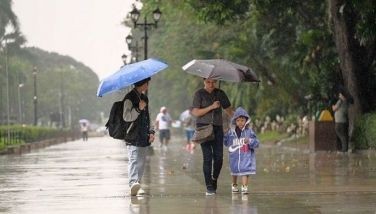Gov’t bids out Japan property for ¥1.78 B
February 13, 2004 | 12:00am
The government has bid out the development contracts for three of its remaining properties in Japan for a total of ¥1.78 billion, a transaction that is expected to fan controversies if approved by the Arroyo administration before the May elections.
Sources from the privatization office said all three properties were successfully bid out last year under a hybrid build-operate-transfer (BOT) scheme.
According to the sources, the privatization of the properties would give the government at least ¥356 million when the agreement is signed and another ¥384 million after three months. The remaining ¥1.08 billion will be paid over a period of three years.
The properties include one four-storey building space in Tokyo with a total floor area of 2,489 sq.m. and two other properties in Kobe with 3,014 sq.m. and 764 sq.m., respectively.
The sale of the assets is expected to draw flak from both chambers of Congress, even if the transaction excludes the lot where the Philippine embassy and the Ambassador’s Residence are located.
Sources said this is the most coveted of all the country’s remaining assets in Japan but the sale and disposition were being aggressively opposed by former foreign affairs secretary Domingo Siazon, who is now the Philippine ambassador to Japan.
"They live there and they don’t want to be booted out so, naturally, they don’t want the government to sell the property," said a source. "Their argument is that it is historical because Yoko Ono once stayed there."
The source said the transaction for the sale of the properties is now pending approval in Malacañang. The Philippines has until March to decide and, if it doesn’t, the bids will lapse and the disposition will be deemed a failure.
A total of 11 firms have submitted bids for all three properties.
"All three properties will be leased for 50 years under a variation of the BOT scheme," the source said, without naming the companies. "The properties are leased for an initial period of 25 years which would be renewable for another 25 years."
The 50-year tenure is the maximum allowable by Philippine laws but sources said the properties had to be leased that long to get the maximum price.
They said proceeds of the bidding could be used to pay off some of the country’s yen-denominated obligations.
Sources from the privatization office said all three properties were successfully bid out last year under a hybrid build-operate-transfer (BOT) scheme.
According to the sources, the privatization of the properties would give the government at least ¥356 million when the agreement is signed and another ¥384 million after three months. The remaining ¥1.08 billion will be paid over a period of three years.
The properties include one four-storey building space in Tokyo with a total floor area of 2,489 sq.m. and two other properties in Kobe with 3,014 sq.m. and 764 sq.m., respectively.
The sale of the assets is expected to draw flak from both chambers of Congress, even if the transaction excludes the lot where the Philippine embassy and the Ambassador’s Residence are located.
Sources said this is the most coveted of all the country’s remaining assets in Japan but the sale and disposition were being aggressively opposed by former foreign affairs secretary Domingo Siazon, who is now the Philippine ambassador to Japan.
"They live there and they don’t want to be booted out so, naturally, they don’t want the government to sell the property," said a source. "Their argument is that it is historical because Yoko Ono once stayed there."
The source said the transaction for the sale of the properties is now pending approval in Malacañang. The Philippines has until March to decide and, if it doesn’t, the bids will lapse and the disposition will be deemed a failure.
A total of 11 firms have submitted bids for all three properties.
"All three properties will be leased for 50 years under a variation of the BOT scheme," the source said, without naming the companies. "The properties are leased for an initial period of 25 years which would be renewable for another 25 years."
The 50-year tenure is the maximum allowable by Philippine laws but sources said the properties had to be leased that long to get the maximum price.
They said proceeds of the bidding could be used to pay off some of the country’s yen-denominated obligations.
BrandSpace Articles
<
>
- Latest
- Trending
Trending
Latest
Trending
Latest
Recommended































